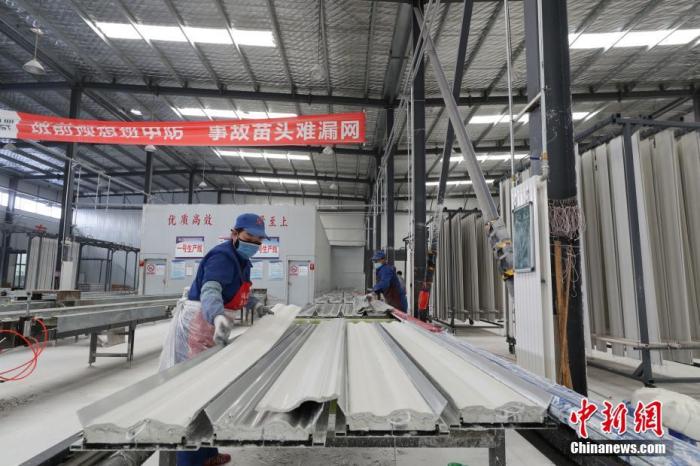China News Service, February 23. On the 23rd, the State Council Information Office held a press conference on the reform and development of civil affairs.
When introducing civil affairs work in 2020, Minister of Civil Affairs Li Jiheng pointed out that the poverty alleviation in 2020 has achieved remarkable results. A total of 19.36 million registered poor people in the country have been included in the scope of subsistence or special poverty support, achieving "everything that should be done."
Data map: Workers are busy in a poverty alleviation workshop of a gypsum company.
Photo by China News Agency reporter Yu Jing
Li Jiheng first introduced the civil affairs work in 2020.
The prevention and control of the new crown pneumonia epidemic has achieved important results: adhere to the people first and life first, strengthen organization and leadership, vigorously support Hubei and Wuhan to fight the epidemic, coordinate the civil affairs work teams of seven provinces to support Wuhan across the provinces, and the leaders of the Ministry led teams to Wuhan to supervise the work.
Extensive mobilization of charitable forces, social organizations, professional social workers, and volunteers to participate in prevention and control, received 39.627 billion yuan of donations and 1.09 billion pieces of materials.
Pay close attention to the prevention and control of civil service agencies such as elderly care, child welfare, civil affairs and mental health, rescue and management of vagrant and beggars, and funerals, and formulate a series of prevention and control guidelines. The civil affairs system of most provinces (regions, cities) and the Xinjiang Production and Construction Corps. Zero infection".
Guide local communities to guard community prevention and control positions, and effectively serve the overall situation of epidemic prevention and control.
Poverty alleviation protection has achieved remarkable results: with the energy of never retreating if they do not win a complete victory, the implementation of social assistance and poverty alleviation actions, and the organization of comprehensive monitoring, a total of 19.36 million registered poor people in the country are included in the scope of subsistence allowances or special poverty support. "Should go all out."
Focus on ensuring that the poor elderly, minors, and severely ill people with disabilities get out of poverty.
Increasing support for deep poverty areas.
Introduce a special policy on community governance for relocation, poverty alleviation and centralized resettlement to consolidate the results of poverty alleviation.
The level of basic people’s livelihood security has been steadily improved: 44.268 million urban and rural subsistence allowances, with a year-on-year increase of 8.6% and 11.7%.
There were 4.77 million people living in extreme poverty in urban and rural areas, and their basic living standards increased by 9.2% and 12.2% year-on-year.
For the first time, 254,000 unaccompanied children are included in the national guarantee.
The living allowance and nursing allowance for the disabled benefited 12.126 million and 14.738 million respectively.
We will do a good job in the care and protection of the people in difficulties affected by the epidemic, issue additional living allowances and price subsidies of 28.5 billion yuan, and provide a one-time temporary assistance to 93,000 uninsured unemployed people.
Guide urban and rural communities and social organizations to actively participate in flood prevention and disaster relief.
In terms of speeding up the improvement of the elderly care service system: During the "13th Five-Year Plan" period, 5 billion yuan has been invested in 203 regions to carry out pilot reforms of home and community elderly care services to create distinctive regional elderly care models.
Continue to increase the number of beds in institutions for the elderly, implement renovation and upgrade projects for nursing homes, and improve service guarantee capabilities.
As of the end of 2020, there were 38,000 elderly care institutions nationwide, an increase of 10.4% year-on-year, and an increase of 37.2% year-on-year; there were 8.238 million elderly care beds in various institutions and communities, an increase of 7.3% year-on-year and an increase of 22.5% year-on-year.
Carrying out the service quality construction of nursing homes for four consecutive years, introducing comprehensive supervision policies for elderly care services, safeguarding the rights and interests of the elderly, and improving the level of “providing the elderly”.
In terms of continuous deepening of grassroots social governance: promote excellent community work methods and deepen grassroots mass autonomy led by party organizations.
The construction of comprehensive service facilities in the community was strengthened, and the urban and rural coverage rate was steadily increased.
Carry out "community universal chapter" governance to reduce the burden on the grassroots.
Strengthen the political construction of social organizations, and increase the coverage of party organizations and party work.
Basically complete the decoupling reform of industry associations, chambers of commerce and administrative agencies, and standardize charging behavior.
Vigorously cultivate community social organizations, develop professional social work and voluntary services.
Deepen the reform of funeral and interment, and carry out investigation and remediation of illegal operations in cemeteries.

